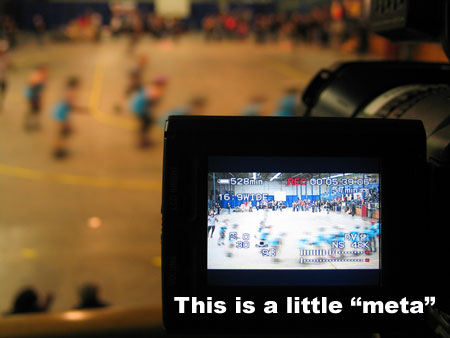META
Early-bird that I am, I was the first to enter the screening-room of Four Eyed Monsters at Boston’s Coolidge Corner last week. Boiled down to a love-story of the MySpace and YouTube age (when is this phrase going to be considered old?), the film is a stirring portrayal of a relationship, as well as an educated–if cringe-worthy–reminder of our dependence and technology and the social awkwardness and self-consciousness it has layered like frosting on many of us.
But aside from what it says, the way it does it reflects another pesky phenomenon of our world–one that pre-dates MySpace by almost two decades. Four Eyed Monsters is also a film about people who film themselves, a picture-in-a-picture type of entertainment, something we’ve come to refer to as “meta.”
We are gathered here today because of “meta.” Meta has been a topic of conversation at my work for a few months–going back to the night when I casually dropped it in a conversation with a woman I had just met, prompting stupor from her at the word, and from me at the idiotic act I had just performed (Note to self: when in crowded clubs where interaction is achieved by shouting, the number of words used should be sparse. The types of words/phrases should be simple–such as “yeah,” “cool,” “want another beer?” and “want to make out?”)
What happened that night went a little like this. She had said earlier that night that it was fun to watch people dance, a statement I endorsed. A while later, I sat next to her (so I could face the dance floor myself) and, being the communicator that I am, I said: “Yeah, it is fun to watch people dance.” At that point she said something to the effect of: “But it’s even more fun to watch people who watch people dance.”
This is where I thought it wise to bust out my urban intellectual self. I declared, emphatically:
“That’s so meta.”
The conversation pretty much ended there, but it was just the beginning of months of back and forth with colleagues–debates revolving around a couple of questions:
1. What is this ‘meta’ business?
2. Can you really use meta as a stand-alone word?
I don’t know if we ever settled the debate, but a recent lunch-time conversation fueled by some print-outs I brought in, signaled that we had to bury the topic if we ever wanted to talk to each other again. These pieces I had found were an August 2006 article (it’s in a paid archive, but you can read it for free here) from the Chicago Tribune on how “meta” has become a separate word, and a 1988 (!) New Republic essay predicting that it would become one.
The Chicago Tribune article is arguably the more historic of the two, tracing the dictionary history of “meta” and then the evolution of the concept from its ancient Greek meaning of “after” to today’s meaning of self-referential whatever. To illustrate the point, author Nathan Bierma says: “I considered writing an article about writing this article, but I thought that would just be too meta.”
When “meta” was first being used, it was taken to mean a level beyond (Metaphysics, for example). But humans can’t resist a word that makes their lives more interesting. As Noam Cohen wrote in the 1988 TNR article, people quickly started attaching it to their own disciplines to spice them up (meta-ethics, meta-criticism etc.) Cohen writes:
These specialties study, respectively, the ethics of adhering to an ethical system, the criticism of self-criticism, and the logic of logical systems. The self-reference industry had been born.
The Oxford English Dictionary realized this was happening and thus this interpretation of “meta” was born:
orig. and chiefly U.S. Freq. in predicative use. Designating or characterized by a consciously sophisticated, self-referential, and often self-parodying style, whereby something (as a situation, person, etc.) reflects or represents the very characteristics it alludes to or depicts.

I soon noticed in my debates with my friends that they didn’t argue that the meaning of the word had evolved–they just didn’t like this evolution. But the fact that words evolve is a given, and whether your are for or against it might not matter much. Being able to study the evolution is much more rewarding.
It was at that point that I realized that disagreeing with the self-referential meaning of the word explains why my friends didn’t think “meta” should never be used alone, something I also disagreed with. To me, “meta” breaking away from the new constructs it found a place in seemed like a logical evolution. This was the meta-meta stage of the word.
What more amused me in this search is that the 1998 article saw the stand-alone use of meta coming a while back (today, it is perfectly common to stumble upon meta by itself in any type of publishing or broadcasting):
According to David Justice, editor for pronunciation and etymology at the Merriam-Webster Dictionary, “meta” currently is “the fashionable prefix.” He predicts that, like “retro”-whose use solely as a prefix, is so, well, retro-“meta” could become independent from other words, as in, “Wow, this sentence is so meta.” If so, you heard it from me first.
* Post edited to I’m From Barcelona‘s “Rec & Play,” a song about songs.

March 5th, 2007 at 12:38 am
This idea of “meta” is a little puzzling. In other words, methods of being “self-reflective?” Isn’t rather complex term for a seemingly simple concept, if I am indeed correct. The Murphy Brown/Connie Chung example appears seems to more appropriately describe irony. What do I know? I’m a dog. Ooh, that’s soooo meta.
March 10th, 2007 at 4:21 am
You should be writing for a magazine, not a newspaper.
March 13th, 2007 at 3:49 pm
Bravo! Scrii genial si iti place Arcade Fire!…Misto om!
March 23rd, 2007 at 10:46 am
The Che/Bart meta-shirt.